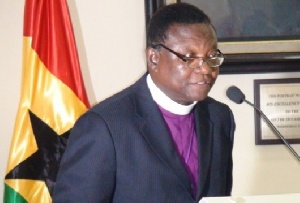 Most Reverend Professor Emmanuel Asante, Chairman of the National Peace Council
Most Reverend Professor Emmanuel Asante, Chairman of the National Peace Council
The Chairman of the National Peace Council, Most Reverend Professor Emmanuel Asante has dismissed claims that politicians can lobby for someone to be appointed chairman of the Council.
According to the former presiding Bishop of the Methodist Church of Ghana, it is completely impossible for anybody to be lobbied to be the Chairman of the National Peace Council.
His comments come after outgoing Moderator of the Presbyterian Church of Ghana, Reverend Professor Emmanuel Martey, disclosed that some government officials approached him to lobby for the position of Chairman of the National Peace Council, but he refused.
But according to Prof. Asante, the Chairman of the Peace Council can only be elected by members of the council.
“Nobody lobbied me...the chairman [of the Peace Council] is chosen by the members,” Rev. Prof. Asante told host of Starr Chat Bola Ray Wednesday evening.
Rev. Prof. Asante added that “the membership of the Peace Council itself is chosen from various institutions, the Christian Council, the Ghana Pentecostal Council, Charismatic Council, Ahmadiyya Movement, from the Chief Imam’s Office, membership from the National House of Chiefs, Membership from NGO’s, the president nominates two people and one must be a woman so that is the composition of the Peace Council.
“So there is no way you can lobby people to say this person should be the chairperson. I did it for four years and ended in October 2015...then the new board came in and I happen to be in there and there was a tight competition [for the Chair]...so of the eleven that voted I had nine votes and the other person had two votes and so I had to stay.”
Profile of Most. Rev. Prof. Emmanuel Asante
Rev. Prof Emmanuel Asante completed his elementary education at the Ejura Local Authority Anglican Middle School in 1965. His secondary education was terminated due to financial difficulties. This initial setback did not deter him. Emmanuel studied privately to upgrade himself.
Most Rev. Prof.Asante gained admission to pursue theological studies at the newly established Christian Service College (now Christian Service University College) in 1974.
After graduating with a Diploma in Biblical Studies, he continued his theological Education at the London Bible College (now London School of Theology) in U.K., graduating with a Cambridge Certificate in Religious Studies and a College Diploma.
He then pursued ‘A’ level studies in Sociology and Government whiles working to raise funds for further studies. Emmanuel’s insatiable thirst for theological education led him to the Federated Universities of Saint Paul and Ottawa in Canada where he pursued studies in Philosophy and Theology from 1980-1986.
Most Rev. Prof Asante has two Bachelors of Theology (Civil and Ecclesiastic), Master of Arts in Theology and Doctor of Philosophy degrees from the Federated Institutions of Saint Paul and Ottawa Universities.
He was ordained as a Pastor in 1986 on the recommendation of the Emmanuel United Church in Ottawa where he did his pastoral internship; He has served the Methodist Church, Ghana in various capacities such as Circuit Minister, Superintendent Minister, Synod Secretary and Bishop of the Kumasi Diocese of the Methodist Church. He also served as Lecturer, Vice-Principal, Academic Dean, and President at Trinity Theological Seminary in Accra.
The Most Rev. Asante has served in various capacities in a number of Ecumenical bodies as a theological consultant for the Fellowship of Christian Councils and Churches in West Africa since 1996. He was also the Methodist Chaplain of the Accra Ridge Church, 1994-1998 and the Senior Minister, Trinity United Church, 1999-2006.
He also served as a member of the Judicial Council of Ghana from 2002-2009 and as a member of the Ejura-Sekodumasi District Assembly, 2006-2009.
On the academic front, Most Rev. Asante served as Adjunct Lecturer, Christian Service University College, 1987-1994, Chairman of Council, Christian Service College, 1992-1994, Senior Lecturer and Associate Professor, Trinity Theological Seminary, 1994-2006, Head of Department of Religious Studies, Kwame Nkrumah University of Science and Technology, 2006-2009.
He has also served as an external examiner in Religious Studies in a number of tertiary institutions in the country and as a consultant on Religious Studies, National Accreditation Board. He has a number of publications to his credit.